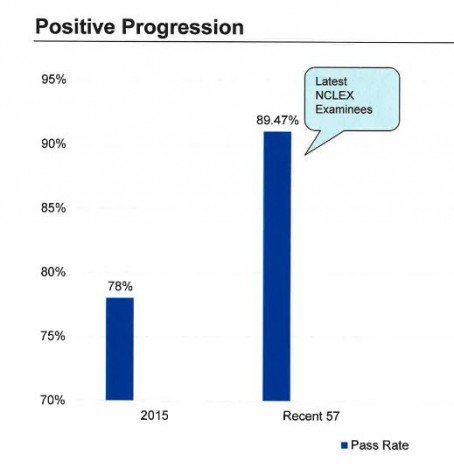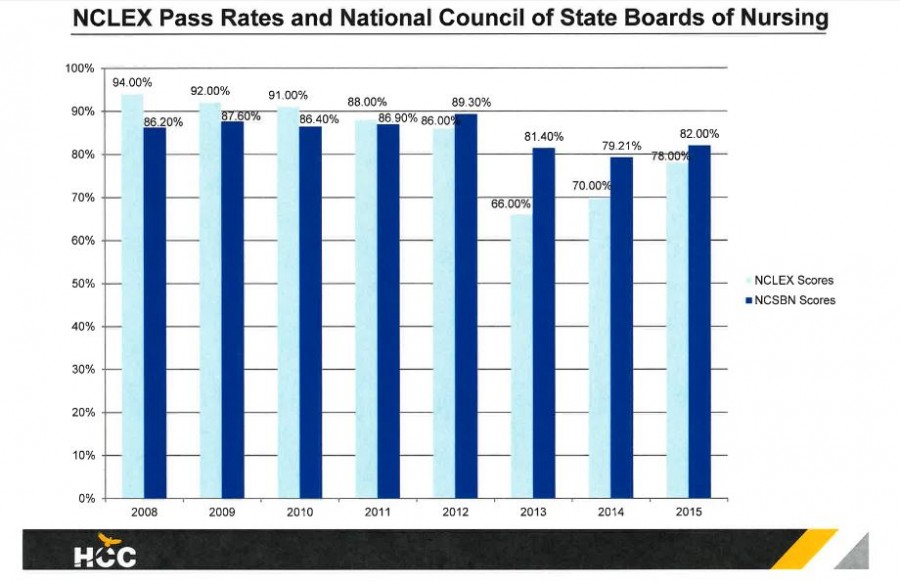HCC Nursing Program: Hanging on with life support
This graph shows the passing rates of Houston Community College’s nursing program graduates on the NCLEX Registered Nurse licensing exam, compared to the national average for the past eight years. For the past three years, HCC has fallen below the minimum requirement of 80 percent passing, and the college’s nursing program is now on probation. The average national pass rate is in dark blue, while HCC’s pass rate is in light blue.
February 24, 2016
The Texas Board of Nursing recently ruled that the accreditation of Houston Community College’s Associate Degree in Nursing program be put on probation status.
The conditional status means that HCC cannot admit any new students into the program. At least 80 percent of current students must pass the National Council Licensure Examination, or NCLEX, in order for HCC not to lose the program.
The state nursing board placed the program on probation after less than 80 percent of HCC nursing graduates passed the NCLEX for the third year in a row. In 2015, HCC’s pass rate was 78 percent.
We reached out to multiple nursing students, but none would go on record for fear of “ruffling some feathers” during their last semesters. One student on the verge of tears described it as “so much pressure” being put on them to perform.
This five-semester program leads to an associate of applied science degree and prepares students to take the national exam to become a registered nurse.
Enrollment continues today in the three-semester Vocational Nursing Certificate program, which prepares students to perform specific duties under the supervision of a registered nurse or other licensed health professional.
“Our advisors are available to provide information on the changes this status has created to assure that those interested in the ADN program are prepared for next spring when we expect the status to be upgraded,” wrote HCC Chancellor Cesar Maldonado in an email to students dated Feb. 2.
Dr. Maldonado stated at a Board of Trustees meeting Feb. 16 that the “root cause of some of the problems that we have now” date back to 2011.

Coleman President Phil Nicotera
HCC’s Coleman College for Health Sciences President Philip Nicotera said that no single problem caused the numbers to decrease, but rather, “a perfect storm of several factors happening all at once.” Dr. Nicotera became the president of Coleman in May 2015, long after the problems had taken root.
In order to increase program enrollment, the required entrance GPA for the program was decreased from 3.0 to 2.5 and a math entrance test was removed back in August 2011.
At the same time, course lengths were changed from 16 weeks to eight weeks long. Dr. Nicotera explained that, “they were trying to master this massive amount of material in an eight week period of time when they truly needed the full 16 weeks to do that.”
The minimum score on the program exit exam—called the HESI—was also removed in August 2011 in order to increase graduation rates. HESI scores demonstrate students’ readiness to pass the national licensing exam.
The program experienced rapid leadership turnover with four program directors in the four year period from 2008 to 2012. Additionally, in a similar four-year period from 2009 to 2013 the nursing program lost 12 seasoned instructors.
There were also changes in the exam structure starting in April 2013. The NCLEX national average pass rate decreased from 89 percent in 2012 to 81 percent in 2013 after the changes. The national average has not returned to the rates from before the change. President Nicotera explained that changes were made because “the exam had not reflected that change in the complexity in the scope of practice.”
Coincidentally, the national exam became harder to pass the same year that HCC students admitted under the 2011 laxed requirements were ready to graduate. The first year HCC’s pass rate fell below the state minimum requirement was in 2013. The college’s pass rate dropped a whopping 20 percent that year, with only 66 percent of HCC nursing graduates passing the licensing exam.
In the following year, HCC’s pass rate increased to 70 percent, and in 2015 the rate was 78.4. “Data doesn’t lie,” said HCC Board of Trustees Chair Adriana Tamez, “our trajectory is going back up.”
Even being a mere 1.6 percent away from the state minimum rule of 80 percent, it was the third year in a row that the college fell below the standard, thus the current probational status.
From 2008 to 2011, HCC’s students outperformed the national average, and in 2012 HCC was close to the average.
To correct the situation, changes were made in fall 2014. The entrance GPA was increased back to 3.0; the math entrance test was reinstated; and courses returned to being 16 weeks long.
An exit exam minimum score of 850 on the HESI is now required “before we allow a student to go and sit for the NCLEX,” said Dr. Nicotera. Such a score on the HESI almost guarantees that a student will pass the licensing exam.
If a student does not make an 850 on the HESI, the student will “remediate with faculty” before re-taking the HESI to achieve that score, explained Dr. Nicotera.
“We’ve gone back to the best practices in nursing entrance requirements and in nursing curriculum,” stated Nicotera.
Also, the college started offering professional exam reviews from outside companies free to students and introduced a series of workshops and tutoring sessions.
Exams in specialty courses have been standardized with sample test questions from HESI.
Starting this semester, if students do not fare well on standardized course exams, faculty members will meet with the student and prescribe a remediation strategy, and the student meets with one of the two new success coaches.
A Test of Essential Academic Skills entrance exam is now in place so that, “we can identify their weaknesses, and we have them work with our nursing adviser to get them the help they need as they go through the program,” said Dr. Nicotera.
“What I think is most important is that our students are successful, and that they do complete the necessary training and meet the criteria required by our downstream partners,” stated Trustee Robert Glaser.
Jolly Joseph has been the stable faculty program director for almost three years. Several weeks ago, he met with current students in their classes to explain the present situation. A simulation faculty member and a clinical manager have also been hired this spring.

Recently, a group of 57 HCC students took the NCLEX and passed at a rate of 89.47 percent. “We’re on the upswing,” said President Nicotera, “we’re well on our way to returning back.”
The Texas Board of Nursing conducted a site visit in December, and the administration gave a presentation to the board in Austin last month to explain the corrective measures HCC has made.
The state board will re-examine the college’s scores toward the end of September. If HCC is back up to above 80 percent passing, in October they may be given the nod to start accepting students again.
All trustees present at the Feb. 16 board meeting expressed their confidence in Coleman President Nicotera and the continuing efforts to save the program. Trustee Hansen concluded that he hopes in the future, “we can treat this as an unfortunate past episode.”

























Jenny • Sep 10, 2016 at 1:22 am
I really feel sorry for these nursing students, and hope they pass their exams. I know because I was in the same situation . But luckily I found a great resource online and passed my hesi exam and nclex AND received free books also. These students should register on this site;
http://bit.ly/hesi-exam
Ellis Dee • Mar 27, 2016 at 1:10 am
Nicotera is just a bureaucrat—knows nothing about nursing – lets all watch HCC nursing go down the tubes. The “teachers” are there just for the ride as the job is real easy. they don’t even have to grade tests (the computer does that for them). I have gone thru the program. All they use is PowerPoints and read them off the wall. No teaching involved.
Brian Techaus • Feb 26, 2016 at 2:29 pm
I hope HCC loses accreditation for everything. HCC is too concerned about money and puts a good education last. Very few professors are able to teach their classes with any sort of success. Often professors just tell students it isn’t their job to teach students. Just to present material. To back up that fact HCC has over 350 acres of undeveloped land bought with taxpayer bond money and has no intention to develop them. It is being used as land speculation in case the bond money keeps getting voted down.